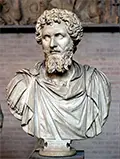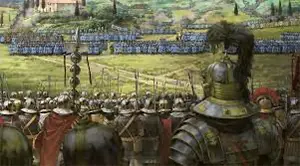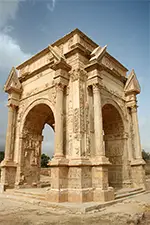The Roman Emperor Septimius Severus
Septimius Severus was Emperor of Rome for nearly two decades at a turbulent time, rounding out the 2nd Century and for the first part of the 3rd. He emerged the victor from the Year of the Five Emperors. 
He was born on April 11, 145, in Leptis Magna, in the Roman Province of Africa. He was a fluent speaker of the Punic language and during his education studied Greek and Latin. He also studied oratory and gave his first public speech when he was 17. He worked his way up the governmental office ladder, the cursus honorum, beginning as quaestor when he was 25. In that year, 170, he also entered the Senate. He served under his cousin Gaius Septimius Severus in 173 and returned to Rome to serve as Tribune of the Plebeians. Two years later, he married Paccia Marciana; she died 11 years later. In 187, Severus, then living in Lugdunum and serving as governor of Gaul, married again, to Julia Domna; they had two sons together. In 191, the emperor Commodus named Severus governor of Pannona Superior. He was serving in that capacity when Commodus was killed. Commodus had descended into madness during the latter part of his reign, had ordered a large number of executions, and had made a number of high-profile enemies. What he hadn't done was have a son or otherwise organize a successor. So his death, no matter how welcome it might have been to many people in Rome, left a void at the top. He was assassinated on Dec. 31, 192. The following year, he was one of five men who lay claim to being Emperor. The other four were these:
Severus, who also had command of three legions, was closest to Rome, and so the emperor Didius Julianus declared Severus an enemy of the state and sent an assassin to kill him. That attempt was unsuccessful, and Severus and troops made their way to the capital. Severus reached out to Clodius Albinus, seeking an alliance with him and offering to declare him Caesar; the two men found common ground. Severus and his legions reached Rome and overwhelmed the Praetorian Guard soldiers whom the emperor had ordered to defend the city. Sources differ on whether the Guard fought for the emperor or deserted him; either way, their defense didn't amount to much. Julianus offered to share the throne with Severus, but the latter refused. With Severus's impending arrival as what appeared to be a conquering hero, the Senate granted him the title of emperor. An abandoned Julianus was unprotected when a soldier came to kill him. He died on June 1. Severus was nominally the ruler of Rome at this point (and had been since April 14, when he was so proclaimed by the Senate), but Niger was still in the field, with three legions at his back, proclaiming him as the rightful emperor. The two armies clashed in series of battles and then, at Issus in 194, Severus was finally victorious. His troops pursued a fleeing Niger and dispatched him. They later seized Byzantium as well. 
Severus, mindful of the chaos that had ensued with the lack of a stated heir, named his son Caracalla as his successor. This triggered a response from Albinus, who renewed his claim to the throne. Albinus had been a consul in 194 and had been the effective ruler of the western half of the Empire. However, Severus, in naming his son heir, stated his intention to embark on sole rule, going so far as to convince the Senate to declare Albinus an enemy of the state. Severus and Albinus fought each other on Feb. 17, 197, at Lugdunum, with forces that approached 150,000 on each side, and Severus was victorious. Albinus was killed during or after the battle. (Sources differ.) Severus was now the sole ruler of the Empire. 
Now that he had conquered his rivals, Severus turned to fighting Rome's external enemies. In yet another struggle against the Parthians, Severus relieved the siege of Nisibis in Mesopotamia and then took the fight to Parthia itself, sacking Babylon and Seleucia and, ultimately, Ctesiphon, the capital. After an aborted attempt to take the fortress of Hatra, he sued for peace and declared victory in the East, taking the title of Parthicus Maximus and creating a new Province of Roman Mesopotamia. As part of its gratitude, the Senate granted him the construction of a Trumphal Arch (which still stands). Rather than return to Rome, Severus continued on campaign, marching his troops in Egypt and restoring order there. He spent a year in Syria before News of fighting on the frontier in Brittania prompted Severus to lead troops into battle there. In addition to pacifying the Caledonians (and taking the title Brittanicus), he oversaw the repair and renovation of Hadrian's Wall. He was on campaign there when he died, on Feb. 4, 211. He died in Eboracum, what is now York. He left behind what he hoped was a plan for a peaceful future. Mindful of the struggle out of which he had taken the throne, he implemented divisions of power, dividing Britain, Pannonia, and Syria into provinces. He also raised the soldiers' annual pay by 60 percent. He also declared that both of his sons, Caracalla and Geta, should succeed him as co-emperors. |
|
Social Studies for Kids
copyright 2002–2024
David White



 finally returning to Rome, in the summer of 202. He returned to his hometown later that year and ordered new construction, of monuments and a basilica and a forum and a harbor. He had brought soldiers with him, of course, and they busied themselves seeing off incursions by desert tribes such as the Garamantes who had been raiding settlements. He toured the former Carthaginian power centers of Carthage and Utica, shoring up the frontier, and then went back to Italy in 203. He stayed in Rome for five years.
finally returning to Rome, in the summer of 202. He returned to his hometown later that year and ordered new construction, of monuments and a basilica and a forum and a harbor. He had brought soldiers with him, of course, and they busied themselves seeing off incursions by desert tribes such as the Garamantes who had been raiding settlements. He toured the former Carthaginian power centers of Carthage and Utica, shoring up the frontier, and then went back to Italy in 203. He stayed in Rome for five years.
